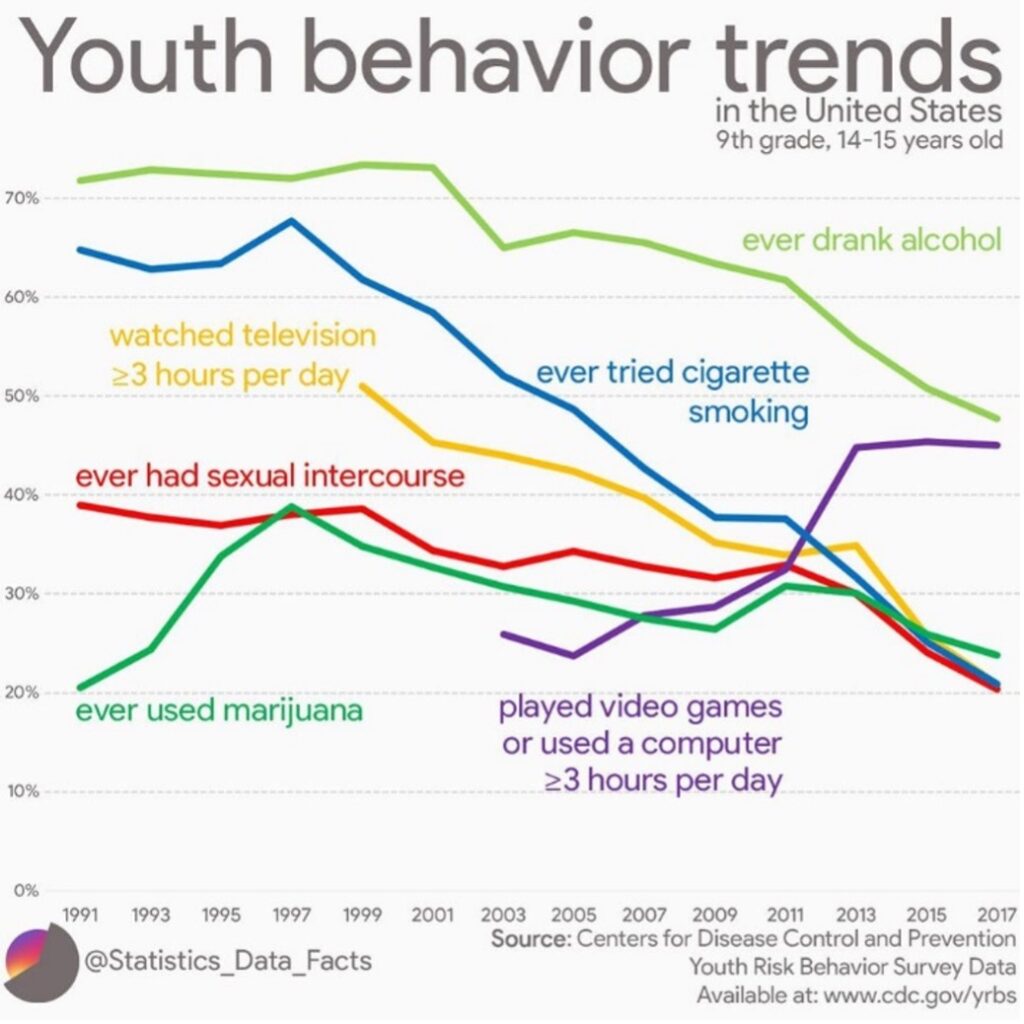A Different Perspective on Teens—and How to Talk to Them
As a mom fully entrenched in the teen parenting season (in the highly sensitive “managing college admissions” phase) and as a social researcher hearing from parents whenever I speak, I’m sensitive to adults’ perceptions of teens and their behavior. Much of the current media messaging and cultural conversation conveys a handwringing, going-to-heck-in-a-hand-basket attitude—a jaded skepticism about the maturity and choices of our teenagers.
I want to give you a different perspective—one that you can use as a way to talk to your kids. And one that might, just might, bring you and your child closer in the process.
Are we looking for the negative because we expect the negative?
Despite the very real issues out there, most of us have also seen the good choices that many teens are making. Which is not always easy in a culture in which it can seem challenging to do the right thing – and is even less easy when teens are far more anxious than ever before. I’ll share some actual data on the trend of good choices in a moment. But here’s the issue to start with: The bad teen behavior tends to be what gets a lot of press—and attention from parents.
This is completely understandable and is certainly needed on a case-by-case basis when an incident or pattern of behavior needs to be addressed. But it can also be all too easy to look for problem behaviors simply because we are highly attuned to the possibility that they are there. In which case we may simply not see or give credit for the good choices.
In other words, we may be missing the good forest because we’re expecting to see the unhealthy trees.
Now, that said, some parents have the opposite problem. We do always need to be wise and aware and not burying our heads in the sand about what our darling do-no-wrong-honor-student might actually be doing wrong!
But just because a student occasionally does something wrong out of a desire for freedom (or out of a fear of losing it), doesn’t mean the wrongdoing defines who they are or who they are becoming. In my research with more than 3,000 teens for For Parents Only and other books, the vast majority of kids want to grow up to be a “good person.”
So here’s the hard but essential question to ask yourself—and your kids: Am I perhaps expecting the negative and thus focusing too much on what they are doing wrong? Am I missing the good?
Because there is a lot of good out there. Before I come back to how to have a conversation with our kids about this, let’s review some new and hopeful research regarding the state of teens overall.
Risky behaviors of teens in key areas have decreased.
This chart should encourage a lot of parents. It’s from the latest Youth Risk Behavior Survey released by the CDC’s Division of Adolescent and School Health. Over the most recent 15-year period, 9th graders in the U.S. (14-15-year-olds) have shown a huge decrease of risky behavior! Contrary to how it might seem, there has been a significant drop in the ratio of kids who have ever drunk alcohol, ever tried marijuana, ever smoked a cigarette, or ever had sexual intercourse.

What this means is that many of our kids, to some degree or another, have been hearing our warnings about bad choices and heeding them! Sadly, this is not all of our kids, but the percentages have been improving—in some cases dramatically.
I very personally know how annoyed we may get at other behaviors we view as slothful or frustrating (as you can see on the chart, the main teen behavior that actually increased was video gaming/computer use, in part because of the accessibility afforded by smartphones). But we can’t let those frustrating choices distract us from praising their less risky behaviors overall. In fact, adults should be shouting from the rooftops about how grateful we are that more kids are avoiding the traditional traps of sex, drugs, and alcohol. They deserve a lot of credit and praise for their healthy choices.
So here are the next questions we can use as a conversation prompt with our kids: Have I been giving you enough praise for your good choices? More to the point: Have I been aware of when those good choices cost you something? (For example, fitting in with those peers who might be making a different choice, or simply because you are not doing something unhealthy that you really want to do?) It is so essential to develop a relationship with our kids that allows them to share what they are really thinking and feeling. Which leads to the last point.
Let’s discuss and model with our teens the concept of “wrong versus wise.”
In a series of interviews recently, I became aware of a young man who I will call Jason. Jason is 17 years old, a Junior in high school, and is unfortunately part of a risk-taking crowd at his school—a group of about 15 boys who have been friends since elementary school. They all play on the football team together—and they often get together on weekends to drink and smoke weed at whichever house doesn’t have parental oversight that weekend.
Here’s the amazing thing: while everyone around him is getting high, Jason abstains. He will still spend these evenings with the only long-time friends he has, but he doesn’t engage in the risky behavior. And he wants to go to college and find other friends who will help him live a better life.
Why? What is leading him to this choice?
It seems highly related to the fact that his parents have worked to come alongside him and create a real relationship that is marked by mutual respect. I’m sure his parents wish he wasn’t at these parties, but they don’t prevent him from going. They have instead spent the last years purposefully doing things together with him (hobbies, hiking, trips) and trying to model and discuss character and wise choices in the midst of temptation.
Now, some may disagree with the parents’ decision to allow him to hang out with those friends. Others may counter that a 17-year old could figure out how to see them anyway, and he needs to learn to make good choices even when surrounded by those who are not. But regardless, there is one method employed by Jason’s parents that is important to consider. While writing my book, For Parents Only, I discovered how much it impacted kids when their parents moved beyond the “easy” discussion of “wrong versus right” and instead modeled and discussed the concept of “wrong versus wise.”
It is essential to draw our kids into a conversation that will help them internalize the reason for the rules: “Why do you think the rules exist?” “Do you think that rules are enough to bring change?” “How can someone resist an unhealthy temptation even if there isn’t a “rule” against it?” The kids will eventually articulate what you most want them to “get”: The rule ultimately exists because of the need to do what is wise and healthy for my life and the lives of others. It’s against the rules to drive 100mph, but the main reason to avoid it isn’t just the “rule” but because I might kill myself or other people. And here’s how I can resist that temptation when my friends start road racing.
Yes, we as parents have to be wise too. But part of that wisdom comes from celebrating our kids’ wise choices and victories and not harping on the video games or social media use that we wish were different. Our kids need to be equipped to counter temptation and feel that they can do so—and part of that is being celebrated and noticed when they do. As those who follow Christ, if we are living out our faith in an authentic way, our kids will learn to be wise.Whether they, too, choose to follow Jesus and actually make the wise choices will be up to them. But the chances are much greater if we engage with them and praise them for the good character they are showing.
If you are interested in having Shaunti bring research-based strategies, practical wisdom and biblical principles to your next event, please contact Nicole Owens at [email protected].
On our podcast, I Wish You Could Hear This, Jeff and I offer proven steps to help you thrive in your life, faith and relationships. In other words, we’ll offer the practical help you’ve grown accustomed to right here in this blog space. You’ll take away specific steps that help you today. Listen, follow, and share with your friends on YouTube, Apple Podcasts, Spotify and other platforms.
Please note: This post may contain affiliate links. As an Amazon Associate we earn a small amount from qualifying purchases through these affiliate links. This doesn’t cost you anything, and helps us continue bringing you great content!







